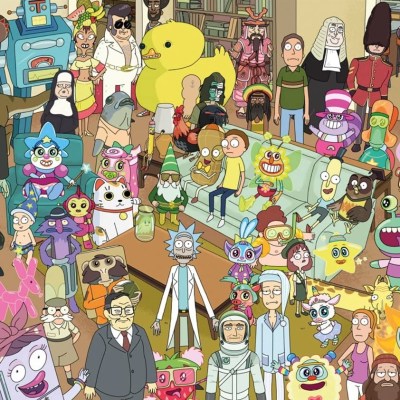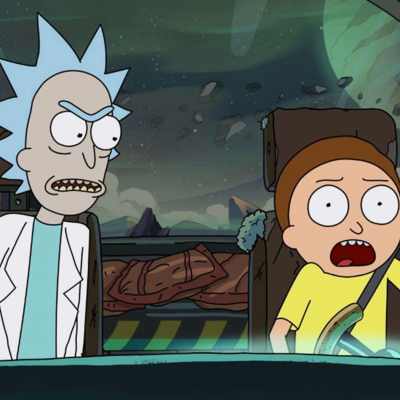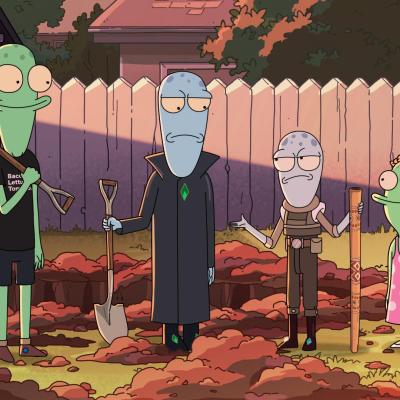Rick and Morty season 5 is nearly upon us and, even among all the high-quality productions released at a rapid clip these days, the show still stands out as a unique television experience. Yes, there are a lot of amazingly well-crafted dramas (I’m looking forward to the conclusion of Better Call Saul) and this seems to be the heyday for brilliant comedies that actually turn out to be the most heartbreaking thing you’ve ever watched (I’m looking at you, PEN15). But truly great sitcoms that do what sitcoms are historically known to do—namely make you laugh a lot and endear you to a cast of characters—are rarer.
For those of us who grew up with the golden age of The Simpsons and like our sitcoms densely packed with clever, layered jokes, there’s a lot less out there. Bob’s Burgers and its offspring The Great North are pretty great, but there’s a simpler, gentler vibe to those. Their storylines are solidly constructed, they’re full of heart, and you can usually count on several laughs per episode (The Great North‘s Judy Tobin might be the most notable breakout comedy character since, well, Rick and/or Morty). However, they’re a far cry from the Simpsons tradition of semi-madcap, complex plotting and rapid-fire gags that hardly let you catch your breath.
The last series that gave me what I was looking for in a sitcom and then some was Community, created by Dan Harmon. At its peak, the scripts sang with tight, clever plotting; joke stacked upon hilarious joke; and characters so wonderfully charming they made you wish you’d been in a community college study group, it looked so damn fun.
However, there was also the “and then some.” Community wasn’t just retreading the ground worn by classic sitcoms past. As a product of a more media-savvy era, it packaged its earnest, heartfelt sitcom stuff in a self-aware, meta framework with the events of many episodes guided by classic genre tropes (the genesis of this parody/homage method of TV storytelling probably originated with the UK sitcom Spaced, but Community took the torch and really ran with it). Further in contrast to classic sitcom protocol was that Community made character and world development a cornerstone. Where old-school sitcoms—from I Love Lucy all the way up to The Simpsons—prioritized a familiar setting and characters who “reset” every episode so that new viewers could jump in at any time, Community (taking a cue from shows like Arrested Development but being quite different in execution) pushed the weirdness threshold of its universe further every season and the changes characters and their relationships went through weren’t just one-offs—they stuck and evolved the dynamic of the series as it progressed.
I was a champion of Rick and Morty before it even premiered. I’d followed Dan Harmon’s career from back when he was making things on the internet and my favorite thing he’d ever done that I will never shut up about was a series of animated shorts called Mr. Sprinkles, which was made in collaboration with Justin Roiland. Despite all the episodes adding up to little over twenty minutes total, it still featured everything I loved about Harmon’s work, packing a ton of worldbuilding and character development in at a breakneck pace.
Read more
However, Roiland’s involvement added some new spices to the usual Harmon flavor: ultraviolence and gross-out humor, yes, but, more importantly, extremely dark, emotional lows and poignant—well, not quite highs—but bittersweet moments that hit hard. It was a powerful and unique combo that resulted in one of my all-time favorite pieces of media, so when it was announced the two would be working together again for a new series, I predicted it could very well be the best thing ever made.
And I was right! Well, at first, anyway. The first season of Rick and Morty is one of the most surprising and confident comedic works ever put on television. In true Harmonian fashion, it used his and the audience’s shared knowledge of sci-fi tropes to rapidly advance the development of its multiverse and characters and, Roiland-style, it shocked viewers with the devastating emotional depths it was willing to plumb (and it also had violence and lots of gross burping). Unfortunately, after that first season, Rick and Morty ran into some familiar problems.
The problems were familiar because they’d showed up previously in Community. That series evolved and pushed the limits of its world for three seasons and Harmon’s original plan was to keep following that trajectory and move the protagonists’ lives further outside the confines of the community college setting with the characters themselves embodying the community of the show’s title. However, before that could happen, Harmon was fired. Following an abysmal fourth season, he was rehired, but felt he had to reorient the series, which meant keeping the characters in community college for the remainder of the show’s run.
It’s understandable why Harmon felt he had to approach his return to Community this way but it’s also the reason that, even though the series was overall better with him back in charge, it never reached the heights it had in the early seasons. Community was about growth and change and, though it tried to get more experimental while staying within its old confines, there was a sad sense of stagnation hanging over the proceedings up until the end. In other words, the radical ambition of Harmon’s earlier work spelled doom for the later (perhaps unavoidably) safer stuff.
The problem that Rick and Morty faces is that it burned through its world and characters even faster than Community did before it. Again, it made for an incredible first season. It was a season that said: “Hey, you know these sci-fi tropes, right? God-like character who can do pretty much anything and can jump through an infinite supply of crazy universes at will? Well, since you already get it and we already get it, let’s just go for it.” And so, you have a season in which the protagonists use and abuse their sci-fi tropes so hard that only six episodes in they destroy their home universe and are forced to take shelter in another universe in which they’ve previously died. When a series so early on establishes that its protagonists can jettison their problems by starting up a new life in a whole new universe, how do you create satisfying conflicts anymore? Where do you go from there?
Look, I get that I might be taking the show’s sci-fi rules a bit too seriously. Rick comments that they can only start a new life in a new universe so many times, which, with endless permutations of universes available to them, doesn’t really make any sense, but that’s the point. The series doesn’t always want you to think of these sci-fi rules as concrete guiding principles. To wit, last season’s “Never Ricking Morty” seemed to poke fun at fans for expecting too much from serialization. If you don’t take what you’ve learned about the multiverse too seriously, Rick and Morty can just keep getting into trouble in all manner of crazy universes. But unfortunately, the development extends to the characterization as well.
Just as in Community, character development sticks and Rick and Morty are extremely different characters from the ones they were at the show’s start. Morty is far more jaded now, quite rightly; you’d be jaded too after burying your own corpse. In fact, the entire Smith family (except maybe Jerry) are sick of Rick’s crap and his position as the alpha is very much in question.
Rick and Morty certainly is, in part, a sci-fi cartoon sitcom that’s just trying to make you laugh, surprise you, and gross you out in each episode. However, its depth and ambition are what set it apart. It’s the pop culture phenomenon that it is because of how well-crafted it is and because of how unique and exciting it was that it was willing to go all-out in its first season. We’re endeared to the characters because it makes sense that an almost-all-powerful being like Rick would be cynical and pessimistic and that Morty would transition from a gee-whiz kid ready for adventure into a world-weary traveler who kind of hates his grandpa.
Read more
As much as I see some fans claim the serialization should be ignored and is just the creators “trolling” (gosh, they sure put a lot of work into these episodes just to troll lil’ old me), I’m quite certain you’d find it very odd and annoying if Morty suddenly regressed to his pilot episode persona for no reason. In fact, this sort of happened back in season 2’s “Mortynight Run,” in which Morty caused a lot of death and destruction in his naïve pursuit to rescue a sentient fart cloud. I was actually fine with this episode myself as I felt Morty still retaining some naivete at this point was not entirely out of character, but a commenter noted that it felt like Morty was relearning a lesson he’d already learned, which I couldn’t really argue was incorrect. And, with everything Morty’s been through in subsequent seasons, it would only make less sense now for him to devolve back to his early, innocent form.
This means you get a lot of episodes in which Rick and Morty deadpan their way through threats, murdering up whatever gets in their way as though every otherworldly intergalactic threat is merely a nuisance to be brushed aside. This makes perfect sense after what we’ve seen these characters survive, but it’s not particularly exciting to watch, and gets old. It also makes sense that the Smith family are regularly antagonistic toward one another after all the sci-fi dysfunctionality they’ve been through, but that gets super unfun to watch and seems entirely at odds with what Rick and Morty is at its core: a sitcom. We’re supposed to be endeared to these people, not put off by them.
Rick and Morty has backed itself into something of a damned if it does, damned if it doesn’t situation. If it retcons all its character and world development, it’ll feel cheap and unfair, but if it maintains the status quo, we’ll be getting a lot more episodes where all-powerful beings who hate each other effortlessly whack-a-mole their way through conflicts (the trailers haven’t revealed a ton, but the tone unsurprisingly feels like it’s mostly sticking to the latter approach). Perhaps all the blame shouldn’t be put on Dan Harmon’s shoulders, but the problems feel like the same ones from Community. I must reiterate that I remain glad regardless that there’s a Harmon-helmed series on TV because, even if the conflicts are lacking and the characterization has gotten a bit stale, no one else is doing complex, breakneck plotting that stuffs gags into almost every possible moment.
Or at least that used to be true. There are now multiple writers out there who’ve emerged stronger from a Dan Harmon writing room. As a result, we’ve got Solar Opposites from Mike McMahan and Justin Roiland, which, unlike Rick and Morty, has (at least so far) managed to have its cake and eat it too with a core cast who follow the classic sitcom tradition of silly characters dealing with self-contained conflicts, but also a portion of every season’s runtime is dedicated to another group of characters’ concurrent, darker, more dramatic, serialized story.
McMahan is also the creator of Star Trek: Lower Decks and he’s brought his solid plotting and above-average joke-writing to that show, too. Michael Waldron started out as a writer’s assistant on Community and then wrote for Rick and Morty and Dan Harmon’s animated improv role-playing show HarmonQuest. He’s since he’s been brought aboard by Disney to write Loki, the upcoming Doctor Strange sequel, and the screenplay for Kevin Feige’s as yet untitled Star Wars film. Former Rick and Morty writer Jane Becker now has a Simpsons episode writing credit under her belt, which makes everything come nicely full circle (a la Dan Harmon’s famous story circle). Furthermore, there’s even a new Dan Harmon cartoon on the way called Krapopolis that I’m willing to bet will at least start out very strong and, if we’re lucky, this one won’t fall victim to the Harmon Curse.
Plus, the Harmon Curse is hardly absolute. In spite of its somewhat depressing twilight years, Community stuck the landing with a beautiful series finale and, similarly, Rick and Morty still totally works a lot of the time, e.g., I really enjoyed the season 4 finale specifically because it brought back serialization. Even though it often feels like the characters on this show hate each other or that there are no real stakes to the conflicts, sometimes it pulls off an episode that makes me forget all that and just have a good time.
It’s also not entirely impossible for Rick and Morty to reintroduce stakes and sitcom character likability. There’s the aforementioned fact that Rick’s standing in the Smith family is in flux, so there’s possibly emotionally resonant character stuff to wring out of there. And, though it certainly wouldn’t be good to overuse him, there’s always fan-favorite Evil Morty, whose dark influence seems to transcend universes, making him a palpable lurking threat to the titular duo.
As Disney’s stranglehold over all of existence only grows more absolute and seemingly every other TV show is either a superhero show, a Star Wars spinoff, or an origin story series nobody asked for about a side character from a classic film, I remain glad a creative visionary like Dan Harmon is still in the business. We’ve got great Harmon-adjacent series like Solar Opposites and Lower Decks, plus another upcoming new Harmon show, and former Rick and Morty and Community writers all over the industry. Dan Harmon’s unique influence reverberates throughout modern media and our entertainment is all the better for having him.
Rick and Morty season 5 premieres June 20 on Adult Swim.



